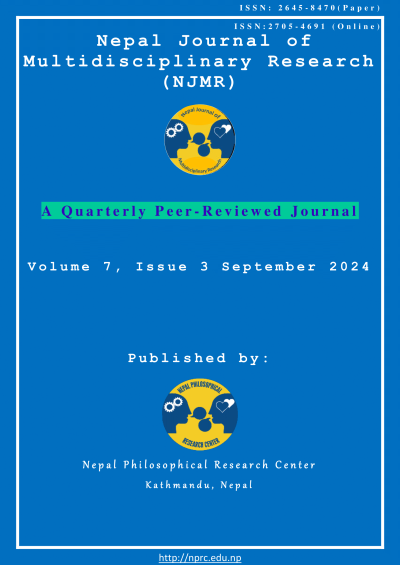ChatGPT Literacy for Fostering Language Proficiency and Writing Skills in ESL/EFL Classrooms
DOI:
https://doi.org/10.3126/njmr.v7i3.70859Keywords:
Teaching writing, Artificial Intelligence (AI), ChatGPT, prompting literacy, ESL/EFL pedagogyAbstract
Background: The article posits that ChatGPT literacy functions as a pedagogical imperative to foster the writing skills of English as a Second Language (ESL) and English as a Foreign Language (EFL) students. The goal of the article is to explore key literacy skills that are crucial for the ethical and responsible use of ChatGPT in enhancing the teaching of writing skills to ESL/EFL students.
Method: Drawing upon the theory of Artificial Intelligence (AI) literacy (Dobrin, 2023) and ESL/EFL pedagogy of microlearning activities (Kohnke, 2023), this study employs a method of qualitative content analysis (Krippendroff, 2019) of 23 ChatGPT-generated texts as responses to given prompts. The qualitative analysis and interpretation of the given prompts and ChatGPT’s responses have been discussed in four rubrics, namely parts of speech, sentence formation, paragraph writing, and genre convention.
Result: The result of ChatGPT’s responses led to the findings that four literacy skills—literacy of prompting, literacy of hooking and specifying, literacy of qualifying and quantifying, and literacy of rhetorical situations—are some useful techniques for the use of ChatGPT in advancing ESL/EFL writing skills in various educational contexts.
Conclusion: Integrating ChatGPT into ESL/EFL writing classrooms can be productive for both writing instructors and students, provided that microlearning activities are implemented to enhance the effective, ethical, and responsible use of ChatGPT.
Novelty: The paper demonstrates innovative strategies for using AI writing technology such as ChatGPT and shows the importance of effective prompting literacy for a productive conversation to happen in the writing classroom of ESL/EFL students.
Downloads
Downloads
Published
How to Cite
Issue
Section
License
Copyright (c) 2024 The Author(s)

This work is licensed under a Creative Commons Attribution-NonCommercial 4.0 International License.
This license enables reusers to distribute, remix, adapt, and build upon the material in any medium or format for noncommercial purposes only, and only so long as attribution is given to the creator.




